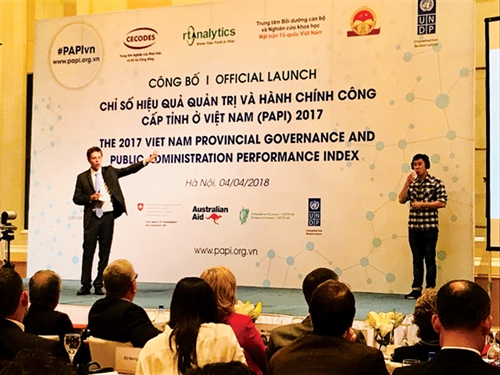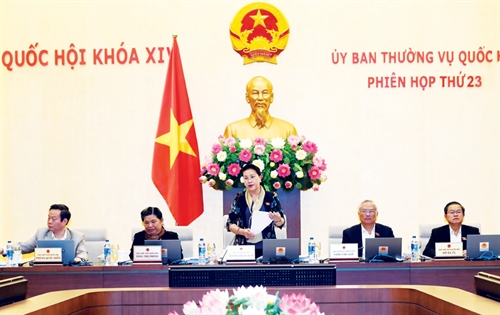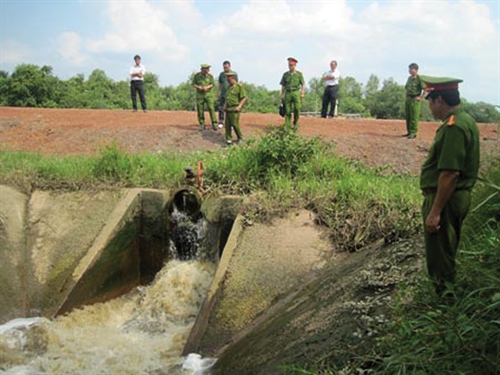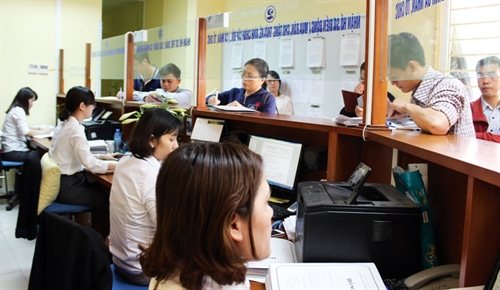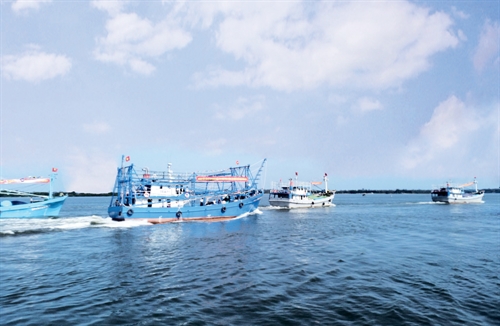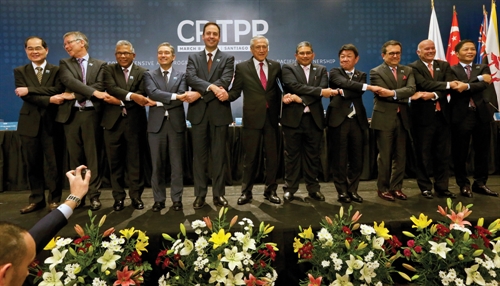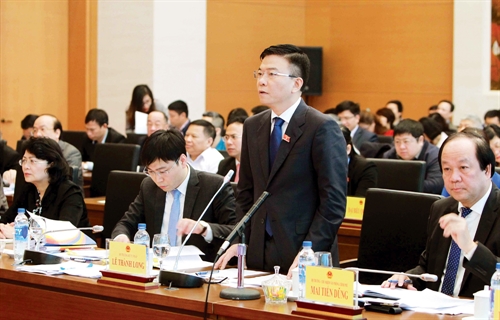Illegal, unreported and unregulated (IUU) fishing has had negative impacts on the coastal countries, including Vietnam. The author reviews the situation of IUU fishing in the region and recommends legal and practical actions to fight this problem in response to the EU’s warning against Vietnam’s fisheries products imported to the Union
Nguyen Thi Kim Ngan, LL. D.
International Law Faculty
Hanoi Law University
IUU fishing by foreign vessels in Vietnam’s waters
Fishing activities of foreign fishing vessels in Vietnam’s maritime zones are regulated by the 2012 Law of the Sea of Vietnam, the 2014 Law on Environmental Protection, the 2015 Law on Marine and Island Resources and Environment, and especially the 2017 Law on Fisheries, which is due to take effect from January 2019. As per the 2017 Law on Fisheries, foreign organizations and individuals may have their fishing vessels licensed for fisheries activities in Vietnam’s waters if they: (i) satisfy requirements set out in relevant international agreements, (ii) have a license of the nation having vessels, (iii) have an investment registration certificate granted by a Vietnamese authority or a fishing cooperation project with Vietnam, (iv) have vessel tracking devices as required.[1]
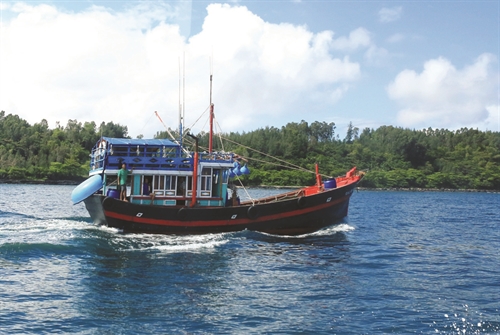 |
| High-capacity fishing vessels in Quang Ngai province made for offshore fishing__Photo: Ngoc Ha/VNA |
Acts regarded as illegal fishing under Vietnamese law include: unlicensed fishing; fishing in no-fishing zones or during no-fishing seasons; fishing aquatic species of a size smaller than the prescribed size; using banned fishing gear; illegal fishing in maritime zones under the management by regional fisheries management organizations, other countries or territories; having no or having improper or failure to operate information and communication devices and vessel tracking devices.[2]
Foreign vessels conduct fishing activities in Vietnam’s maritime zones will be subject to inspection and control by competent Vietnamese agencies. Upon detecting violations, these agencies may handle them with administrative measures, force foreign fishermen and vessels to stop their illegal fishing and leave the areas where they are fishing or Vietnam’s waters, arrest fishermen and vessels caught in the act and make written records of violations in accordance with Vietnamese law.[3] Specific measures to be taken against violating vessels are provided in the 2015 Penal Code (as revised in 2017) and Government Decree No. 103/2013/ND-CP dated September 12, 2013, on sanctioning of administrative violations in fisheries.
Although the above regulations on prevention of illegal fishing have been enforced, over the recent years the number of foreign vessels conducting illegal fishing in Vietnam’s maritime zones has been on the rise. A reason for this situation is that measures taken against violating vessels are not severe enough to deter their illegal fishing and the operation of law enforcement forces at sea remains ineffective. Vietnam has applied mainly the measures of driving away or arresting and administratively sanctioning violating vessels before releasing them.
In the coming time, more deterrent and punitive measures are needed to severely handle illegal fishing acts and prevent their reoccurrence, such as increasing monetary fines and bails and more frequently applying such additional penalties as impounding vessels, depriving of fishing licenses, suspending fishing projects, and so on. Foreigners whose fishing vessels engaged in serious illegal fishing will face criminal charges under Vietnamese law and in conformity with international law.
Besides, Vietnam should enhance cooperation among such enforcement forces at sea as Marine Police, Fisheries Surveillance Force, etc., in order to safeguard the national sovereignty, sovereign rights and jurisdiction over the country’s maritime zones. It should also step up international cooperation in information exchange, human resource training and technology transfer; intensify joint patrol and control operations at sea; and flexibly coordinate with foreign countries in arresting and punishing violators.
Protection of Vietnamese fishermen and fishing vessels arrested by foreign countries
Vietnam now has approximately 2.5 million fishermen and fishing logistic service employees and over 170,000 fishing vessels operating at sea. For their livelihood and due to their lack of knowledge, not a few Vietnamese fishermen have conducted fishing not only in the national waters but also in foreign waters.
Since 2010, as many as 1,340 Vietnamese fishing vessels with more than 11,000 Vietnamese fishermen have been arrested and handled for poaching in foreign waters. In many cases, these fishermen have faced severe penalties. For example, Indonesian law imposes imprisonment sentences of up to seven years and a fine of up to 20 billion rupiahs (some 1.5 million US dollars) and allows Indonesian authorities to burn or sink foreign fishing boats caught illegally fishing.[4] From January to October 2017, Indonesia blew up and sank 110 foreign fishing vessels, including Vietnamese vessels, for illegal fishing.
In addition to maritime zones that have been clearly demarcated, at present Vietnam still have maritime zones overlapping or involved in disputes with neighboring countries. This has greatly affected fishing activities of Vietnamese fishermen. In many cases, Vietnamese fishermen who fish in maritime zones over which Vietnam has claimed its sovereignty are chased away or even arrested and severely punished by neighboring countries.
Vietnamese authorities have taken all necessary citizen protection measures to protect and bail out Vietnamese fishermen and vessels arrested and subjected to penalties by foreign countries, particularly China, Indonesia, Malaysia, Thailand, Japan and Australia.
One of the important legal grounds for Vietnam to protect its fishermen and vessels is Clause 3, Article 73 of the 1982 UN Convention on the Law of the Sea (UNCLOS), which provides: “Coastal State penalties for violations of fisheries laws and regulations in the exclusive economic zone may not include imprisonment, in the absence of agreements to the contrary by the States concerned, or any other form of corporal punishment.” However, some foreign countries still imprisoned Vietnamese fishermen they had arrested. This situation prompts Vietnam to study how to effectively apply the above provision of the UNCLOS to help its fishermen arrested by foreign countries to avoid imprisonment.
Another important legal ground that Vietnam can apply to protect its fishermen fishing on the East Sea, particularly in the waters subject to China’s claim, is the ruling of the South China Sea (East Sea) Arbitration case (the Philippines v. China) in 2016, which more clearly defines the scope of maritime zones with respect to which China has jurisdiction under the UNCLOS. This is very significant in the context that China continuously chases away, obstructs and rams its ships against Vietnamese fishing ships, and seizes fishing gear of Vietnamese fishermen in the sea areas of the Paracel and Spratly islands.
At present, some countries are lobbying for criminalization of IUU fishing to be regulated by the Convention against Transnational Organized Crime. Vietnam never encourages IUU fishing but needs to carefully study and consider adopting criminal policies against it, especially in the context that fishing activities of Vietnamese fishermen in foreign maritime zones are mostly due to their lack of knowledge and dependence on fishing at sea.
In order to effectively protect Vietnamese fishermen and vessels without encouraging their illegal fishing, it is necessary to implement synchronous measures. It is necessary to provide fishermen with adequate knowledge about the law of the sea and law on fisheries in order to stop their deliberate fishing in foreign waters. Competent agencies, particularly border guards, should promptly detect vessel owners and captains who intend to send their vessels to fish in foreign waters and ask them to sign written commitments not to encroach upon foreign waters. Border-guard stations should squarely refuse to carry out exit procedures for those failing to make such commitments or to fully abide by regulations. All violations must be stopped and strictly handled.
Impacts of EU’s ban on import of IUU fishing catches on Vietnam’s fisheries
The European Union (EU) has its own regulations on IUU fishing. In May 2017, the European Commission worked with Vietnam in issuing a warning and requested Vietnam to deter and eliminate IUU fishing. In October 2017, the EU officially pre-identified (yellow-carded) Vietnam’s fisheries products for the reason that the country’s efforts were neither enough nor effective to deter and eliminate IUU fishing, especially when illegal fishing by Vietnamese fishing vessels in foreign waters remains frequent. The EU also announced that Vietnam’s fisheries products will be identified (red-carded) and can therefore no longer be imported to the EU if the country fails to put an end to the illegal fishing by April 2018.
The EU’s pre-identification and possible identification of Vietnam’s fisheries products pose a great challenge to the country’s fisheries exports, severely affecting the prestige and brand name of its fisheries sector as well as fisheries exports to other markets, including the US where the control system for fighting IUU fishing has been put in place since January 1, 2018. During the pre-identification period, all fisheries export lots to the EU would be held back for tracing, thus costing exporters time and money.
However, the EU’s yellow card for Vietnam’s fisheries products gives an opportunity for the country to enforce more radical measures to prevent IUU fishing for sustainable development. In the near future, in order to make the EU withdraw its decision, Vietnam has published on a monthly basis the list of fishing vessels and vessel owners that violate the IUU fishing control regulations and reorganized the certification of fisheries catches so as to ensure the reliability and crosschecking of information. For a long term, Vietnam will consider joining in the relevant international agreements, such as the 1995 United Nations Agreement for the Implementation of the Provisions of the UNCLOS relating to the Conservation and Management of Straddling Fish Stocks and Highly Migratory Fish Stocks, and the 2009 FAO Agreement on Port State Measures to Prevent, Deter and Eliminate Illegal, Unreported and Unregulated Fishing, in addition to further improving its domestic laws in conformity with its commitments in these treaties. It will also need to work out measures to manage fishing fleets and fishing capacity based on reliable assessment of aquatic resources and species reserves in order to stop overfishing. The country will have to better perform the duty of a flag state for managing and inspecting domestic fishing vessels. Particularly, it will have to improve the system of certification of caught fisheries products as well as the certification process/mechanism in order to meet the importing markets’ requirements on traceability of fisheries products. To designate ports for foreign vessels to enter and transship fisheries products is also another work to be done early.
The mechanism for dealing with IUU fishing has been gradually formed and enforced on a global and regional scale and in every country. Vietnam, as a country actively participating in the resolution of global problems, has been and will continue implementing every measure to prevent, deter and eliminate IUU fishing.-
